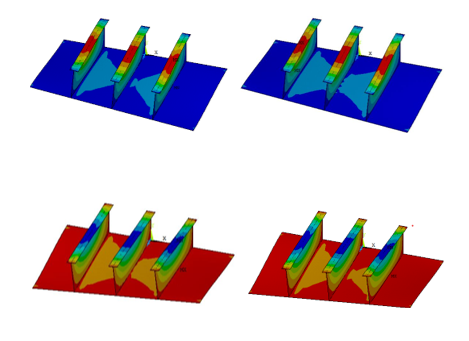Stiffened Plate Analysis by Considering Follow-up Plates in the Effect of One-Way Axial Load on FPSO Vessels
Main Article Content
Abstract
Floating Production Storage and Offloading (FPSO) is the portable offshore structure. The material configuration used is the most important aspect in the FPSO structure design criteria. Plates and Stiffened and plates experience local buckling due to the external load when the hull girder collapsed. The objective of the present study is to analyze the stiffened plates taking the attached plate thickness into consideration on the FPSO in term of plate deformation and deflection located of the bottom area under tension and compression stages. In this study the attached plating thickness is varied according to FPSO data and BKI Rule. The stiffened plate elements located at the bottom are modelled by Tee-Bar element. The simply supported condition is applied to the model and the Non-Linier Finite Element Method (NLFEM) is used for the analysis. The result obtained by NLFEM shows that under tension and compression the stiffened plate of model of the thickened plate of the FPSO, the deflection are 1.75 mm and -1.75 mm, respectively. While for model of corrugated plates with BKI minimum intervening plate thickness the deflection are 1.8 mm and -1.8 mm under tension and compression, respectively.
Downloads
Article Details

This work is licensed under a Creative Commons Attribution 4.0 International License.
Allow anyone to modify, improve, and make derivative works, even for commercial purposes, as long as they credit to you for the original work.
References
F. A. Nugroho, B. Siregar, G. L. Putra, and R. Dhelika, “Study on the alteration of geometrical dimensions of tee stiffeners concerning the ultimate strength characteristics under a vertical bending load,” Int. J. Technol., vol. 9, no. 5, pp. 1027–1038, 2018, doi: 10.14716/ijtech.v9i5.1103.
J. Fajrin, Y. Zhuge, F. Bullen, and H. Wang, “The structural behavior of hybrid structural insulated panels under pure bending load,” Int. J. Technol., vol. 8, no. 5, pp. 777–788, 2017, doi: 10.14716/ijtech.v8i5.861.
M. Z. M. Alie and S. I. Latumahina, “Progressive collapse analysis of the local elements and ultimate strength of a Ro-Ro Ship,” Int. J. Technol., vol. 10, no. 5, pp. 1065–1074, 2019, doi: 10.14716/ijtech.v10i5.1768.
B. R. Kuriakose and J. John, “Nonlinear Buckling Analysis of Stiffened Plate: A Review,” Int. Res. J. Eng. Technol., 2022, [Online]. Available: www.irjet.net.
P. T. S and Z. Muis, “ANALISA KELELAHAN STRUKTUR FPSO PT . IRVINE ENGINEERING DUBAI,” no. September, pp. 89–92, 2018.
R. B. P. Sukoco, W. H. A. Putra, and S. H. Sujiatanti, “Analisis Tegangan Pada Penegar Wrang Pelat Akibat Kemiringan Penegar Wrang Pelat,” J. Tek. ITS, vol. 7, no. 2, 2019, doi: 10.12962/j23373539.v7i2.34475.
W. W. Lei Ao, Hao Wu, De-yu Wang, “Evaluation on the residual ultimate strength of stiffened plates with central dent umder longitudinal thrust,” Ocean Eng., vol. 202 107167, 2020.
I. M. Suci et al., “Studi Penelaahan Beberapa Metode Pada Analisis Kekuatan Kapal,” no. 2018, pp. 24–30, 2020.
I. Melati, N. F. D. Putri, F. Husain, and M. Z. M. Alie, “Stiffened Plate Analysis by Considering the Effect of Uniaxial Load on FPSO Vessels”, mp, pp. 21-25, Oct. 2023.
Safitri, M. Z. M. Alie, and T. Rachman, “Analisis kekuatan variasi pelat berpenegar pada dasar kapal fpso dengan kapasitas 370.000 bopd,” no. September, pp. 96–99, 2018.
P. Talia, Juswan, and M. Z. M. Alie, “Analisis deformasi pelat berpenegar pada sekat membujur kapal double hull oil tanker,” no. September, pp. 100–103, 2018.

